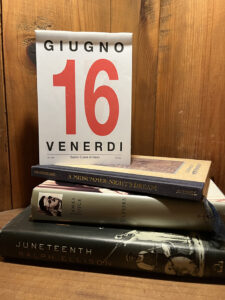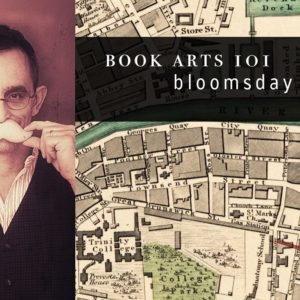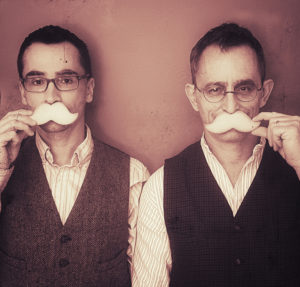And now we enter mid-June and with that entrance come three wonderful celebrations, all of which have at least some literary connexion. First comes Bloomsday on this 16th of June. Ulysses, the stream-of-consciousness novel by James Joyce, was no small feat to write and nor is it so to read. The Modern Library edition I have in my bookcase is 783 pages long. What is perhaps most astounding about Ulysses is the entire journey through those 783 pages takes place all on one day and all in one place: Dublin on the 16th of June, 1904. If you are in Dublin, you can expect to see many people about today in Edwardian garb, following the path that Leopold Bloom took through the city in the novel. The serious ones will eat fried pork kidney for breakfast and they will stop at the apothecary to buy lemon soap and have lunch at Davy Burne’s pub on Duke Street: a Gorgonzola sandwich and a good glass of burgundy.
I am an English major; I love the idea of a literary pilgrimage. Those of us not in Dublin, though, can still make a day of it: you might read some Joyce. If Ulysses is too much for you, may I suggest Dubliners: a collection of short stories also set in Dublin. James Joyce gave us with Ulysses what many consider the greatest novel in the English language, but with Dubliners, he gives us what may very well be the language’s greatest story: its the closing story of the book, a story called “The Dead.” It’s set at midwinter, not midsummer, but still works well for a day honoring Joyce. If you’re not up for reading the story, watch the film adaptation created by John Huston in 1987. It’s excellent. Huston taps into Joyce’s writing style by making the camera practically another character. Another fine thing to do to mark the day: listen to Kate Bush sing a song she recorded in 1989 called “The Sensual World.” It’s based on the closing words of Ulysses, a soliloquy by Molly Bloom, Leopold’s wife:
… and Gibraltar as a girl where I was a Flower of the mountain yes when I put the rose in my hair like the Andalusian girls used or shall I wear a red yes and how he kissed me under the Moorish wall and I thought well as well him as another and then I asked him with my eyes to ask again yes and then he asked me would I yes to say yes my mountain flower and first I put my arms around him yes and drew him down to me so he could feel my breasts all perfume yes and his heart was going like mad and yes I said yes I will Yes.
Ralph Ellison, he gave us his own stream-of-consciousness novel in an unfinished work called Juneteenth, a book I read a couple of Junes ago for that sacred day on the 19th of June. Our newest national holiday is not new at all: it may have been given official designation as a federal holiday just two years ago, but the celebration goes back to June 19, 1865, the day when enslaved people in Galveston, Texas, learned that they were free. The roots of Juneteenth lie in the Emancipation Proclamation, two years into the Civil War. The Proclamation, on the First of January, 1863, freed “all enslaved people in the states currently engaged in rebellion against the Union.” Soldiers of the Union Army made their way across the cities and plantations of the South, reading the Proclamation and spreading the news. In places still under Confederate control, though, the news would take longer to spread. Emancipation Day here in Florida, for instance, came on May 20, 1865, when the news was read in Tallahassee, eleven days after the war had ended.
In Texas, the westernmost Confederate State, Emancipation came a month later. Union troops arrived on Galveston Island on the 18th of June and the next day, June 19, 1865, Union General Gordon Granger read this proclamation from a Galveston balcony:
The people of Texas are informed that, in accordance with a proclamation from the Executive of the United States, all slaves are free. This involves an absolute equality of personal rights and rights of property between former masters and slaves, and the connection heretofore existing between them becomes that between employer and hired labor. The freedmen are advised to remain quietly at their present homes and work for wages. They are informed that they will not be allowed to collect at military posts and that they will not be supported in idleness either there or elsewhere.
By 1866, Juneteenth celebrations were sprouting up all over Texas and continued spreading, mostly among African American communities, throughout the country. These earliest Juneteenth celebrations brought folks out in their finest clothes for parades and barbecue and music. Juneteenth has since become a celebration of hard-earned freedoms, and a celebration of African-American culture. A day for family and friends to gather, a day to share stories, and to learn. And now, for these past two years, a national holiday. The road getting here has never been easy, and so it is as well a day to reassure each other against adversity and challenge. The fact that the road is still being forged is all too evident these days, as we continue to work through our troubled history and find paths forward, paths toward true equality, and toward the elimination of racism at levels to which society seems at times blind. Here in Florida these days, things are only regressing. For those of us who work in state-sponsored education, the limits imposed by state law in the last year on what we can discuss with our students is truly disheartening.
I like to think of Juneteenth as another shot at making things right and Lord knows we need that now. If it helps, think of Juneteenth as this country’s second independence day: independence from backwards thinking. We all have to play our part in making wrongs right.
And in a week’s time it will be Midsummer: St. John’s Eve on the 23rd of June, followed by St. John’s Day on the 24th. It is the setting of William Shakespeare’s A Midsummer Night’s Dream. That’s a night of some powerful magic, and that, my friends, deserves its own chapter in this Book of Days, even though it is a time not held in much reverence here in the US. But that it our loss. Midsummer is yet another June celebration that steps off the pages of books. How wonderful to have our breath still taken away by the things of this world.


